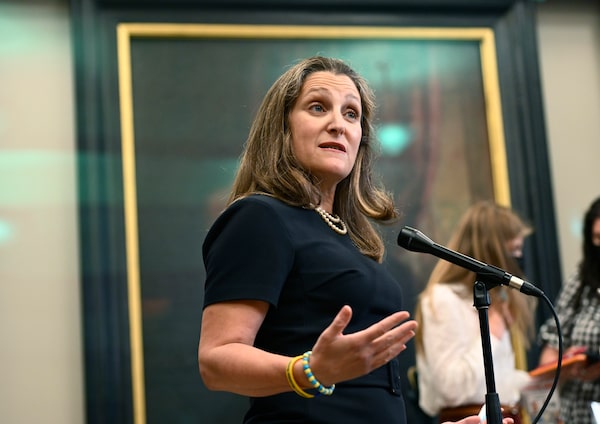
Finance Minister Chrystia Freeland speaks to reporters before heading to Question Period in the House of Commons on Parliament Hill in Ottawa on June 23.Justin Tang/The Canadian Press
When the United States Senate passed the Inflation Reduction Act earlier this week, Canadian political and industry leaders were elated by the legislation’s climate provisions, which seem likely to provide a boost to this country’s electric vehicle industry. But other major changes in the bill set the stage for a trade standoff between the two countries over digital sales taxes.
An earlier version of the U.S. bill would have effectively raised America’s minimum corporate tax rate to 15 per cent. This would likely have put the U.S. in compliance with a key element of a global tax deal announced last summer by Canada and more than 130 countries organized by the Organization for Economic Co-operation and Development, the intent of which was to prevent multinational companies from dodging tax obligations.
But the minimum corporate tax provision was recently dropped as part of a major backroom revision of the U.S. legislation, and the updated bill is expected to receive final approval in the coming days. The reversal means the OECD tax deal may have to go ahead without full participation from the U.S., the world’s largest economy, which would weaken the agreement significantly.
Opinion: Why Biden’s historic climate bill could be a big win for Canada
With the deal under strain, Finance Minister Chrystia Freeland’s office this week repeated an earlier warning: If the OECD agreement is not implemented, Canada will bring in its own 3-per-cent tax on the digital revenues of large multinationals. The move could expose U.S. corporations to billions of dollars in new tax liabilities and complicate economic relations between Canada and its biggest trading partner.
The digital services tax, or DST, would take effect as of Jan. 1, 2024, and would apply retroactively to cover revenues earned as of Jan. 1, 2022.
Ms. Freeland, who is also Deputy Prime Minister, praised the OECD tax deal when it was announced last summer.
The OECD said at the time that the deal, if finalized, would raise more than US$150-billion a year for governments worldwide by cracking down on corporations’ use of tax havens and creative accounting to pay less tax.
The plan proposed two core approaches: Countries around the world would shift tax obligations to emphasize the location of sales rather than the location of a company’s headquarters, and they would agree to a global minimum corporate tax rate of 15 per cent.
Ms. Freeland’s 2022 federal budget specifically mentioned the fact that proposed U.S. legislation planned to implement the 15-per-cent minimum corporate tax rate.
But with the focus of U.S. politics shifting to the November midterm elections, and polls showing control of the House of Representatives could flip from the Democrats to the Republicans, some tax observers say the window for the U.S. Congress to adopt the OECD deal has now come and gone.
In addition to its reversal on the 15-per-cent minimum, the U.S. Congress has made no move to implement the OECD deal’s approach to the location of sales.
When asked this week to respond to the U.S. developments, Adrienne Vaupshas, a spokesperson for the Finance Minister, said in a statement to The Globe and Mail that Canada is closely monitoring international events related to implementing the OECD deal, and that the government is prepared to act on its own.
“Canada’s priority and preference has always been a multilateral agreement, however, to ensure Canadians’ interests are protected, we intend to move ahead with legislation finalizing the enactment of a Digital Services Tax,” she said. “It is our sincere hope that the timely implementation of the new international system will make this DST unnecessary.”
The planned DST was first announced in 2020 and further detailed in the 2021 fall economic update.
Last month, U.S. Trade Representative Katherine Tai issued a statement repeating Washington’s strong concern over Canada’s plans. The U.S. has hinted at retaliatory action against Canada should it adopt a DST. The U.S. has also challenged DST plans in other countries, arguing that OECD discussions should precede any new tax action on multinationals.
Elliot Hughes, a senior adviser at Summa Strategies who previously worked as a tax policy adviser to Ms. Freeland’s predecessor as finance minister, Bill Morneau, said it appears the U.S. Congress will not approve the OECD tax plan, which would set the stage for a significant policy dispute between Canada and the U.S.
“I think Freeland will have to go ahead with it,” he said of the digital services tax. “And that’s going to be a big, big problem and lead to some potentially pretty serious trade issues between the two countries.”
Attention to the U.S. Inflation Reduction Act in Canada has largely focused on the fact that Canadian lobbying efforts successfully secured a change that will make it so American electric-vehicle manufacturing incentives apply to vehicles made anywhere in North America. The bill’s original wording would have applied the incentives only to U.S.-made vehicles.
Ms. Freeland held a news conference Tuesday in Etobicoke at an auto parts manufacturing facility, largely to celebrate the fact that Canada had avoided a major trade dispute.
The Inflation Reduction Act does include a new provision for a 15-per-cent alternative minimum tax on large corporations. The U.S. government estimates the measure will raise $300-billion in new revenue over the coming decade, but the tax is domestically focused and is substantively different from the proposed 15-per-cent global minimum corporate tax. The U.S. acknowledges it would not be in compliance with the OECD deal.
U.S. Treasury Secretary Janet Yellen, who had championed the OECD deal as a global effort to blunt a race to the bottom on corporate taxation, has said through statements to the media from her office that the global minimum tax remains a top priority.
The OECD remains committed to the deal. It announced last month that the deadline for sign-off has been extended until mid-2023, with implementation to take effect in 2024, a year later than previously scheduled.
Ms. Freeland’s April 2022 budget launched consultations on how Canada could implement the global minimum corporate tax rate. The consultations closed on July 7, and the government has not released any further information on the status of that plan.
A recent Globe and Mail analysis detailed Amazon’s extensive efforts to limit its executive presence in Canada in order to legally reduce its tax obligations in Canada. This included a directive that no company directors and officers were to live in Canada and all books and records were to be kept in the U.S.
A Canadian DST would aim to counter such legal tax avoidance tactics, which are often used by foreign multinationals with large customer bases in Canada.
Wei Cui, a professor of tax law and policy at the University of British Columbia, said there have been significant misunderstandings related to the various tax proposals.
He said the latest U.S. tax plan does include some international elements that strengthen taxation of U.S. multinationals beyond existing law. He noted that Washington already took a leadership position with a 2017 policy known as Global Intangible Low-Taxed Income, or GILTI, which changed the U.S. government’s treatment of foreign-sourced income earned by U.S.-controlled companies.
The Inflation Reduction Act’s predecessor, the Build Back Better Act, would have raised the effective GILTI tax rate from 10.5 per cent to 15 per cent, which is why some observers have said the original bill would have allowed the U.S. to comply with the OECD’s global minimum tax.
Although that proposed tax change was removed as part of the revised Inflation Reduction Act, Prof. Cui noted that the new legislation still increases taxes on the foreign income of many large U.S. multinationals.
Just as the U.S. is taking its own approach to taxing multinationals, Prof. Cui said, so can Canada. He argued that statements by political leaders suggesting all countries must act in unison are problematic.
“That’s a kind of political rhetoric that has always been detached from reality,” he said.
For subscribers: Get exclusive political news and analysis by signing up for the Politics Briefing.
 Bill Curry
Bill Curry